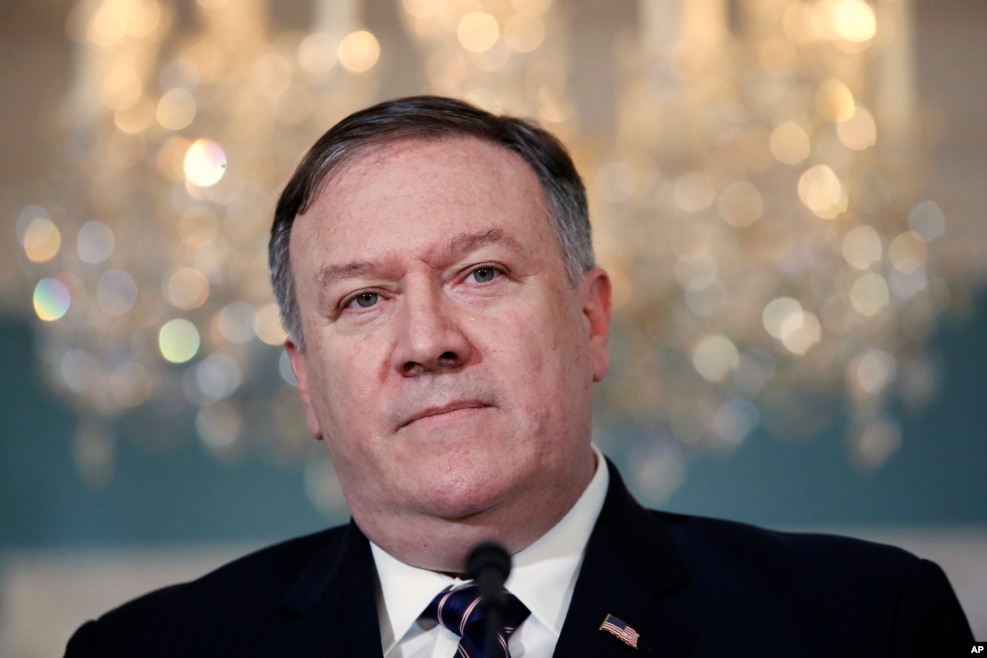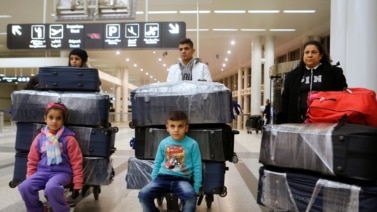
The government of U.S. President Donald Trump announced this week that it plans to limit the number of refugee arrivals in the U.S. to a record low number. But refugee activists and lawmakers say Congress still has time to change the president’s mind.
On Monday, Secretary of State Mike Pompeo spoke to reporters about the plan. He claimed that refugees can be a security threat to the United States. In answer, he said, the executive branch is proposing a limit of “up to 30,000 refugees” in the fiscal year that begins October 1. If approved, the number would be the lowest since the early 1980s.
Before the president makes the final decision, however, lawmakers in Congress must be able to give their advice.
Jen Smyers is with the Church World Service, one of the leading refugee resettlement groups in the United States. She says government officials often suggest a number before the final decision is made. And, she says, Congress has succeeded before in increasing the planned number of refugee arrivals.
But, she added on a telephone call with reporters, “the timeline is tight.” The final decision will be made by the end of this month.
Trump has already cut refugee numbers
During Trump’s first year in office, his government set the limit at 45,000 refugees. However, with less than two weeks remaining in the fiscal year, less than half of that amount has been reached.
Philemon Dushimire is a refugee from Burundi who now lives in Maine. There, he is a community organizer among the Burundi immigrant and refugee community. He told VOA that the decrease in the refugee limit may affect how the United States is viewed abroad.
“The risk now [is that] America will be seen as a country which doesn’t care about human rights violations in some places of the world. Which doesn’t care about the safety of people in danger,” he said.
Some lawmakers from both major parties have criticized the proposed refugee limit.
Democratic Senator Ed Markey of Massachusetts accused the Trump government of trying to isolate America and not caring about people suffering around the world.
The Trump administration is proposing to slash refugee admissions before the legally-mandated consultation with Congress. At every turn, we must resist this administration’s efforts to isolate America and abandon the persecuted. https://t.co/GHXUdqQgD8
— Ed Markey (@SenMarkey) September 17, 2018
Representative Ileana Ros-Lehtinen, a Republican from the Miami area, also answered on social media. She is a political refugee herself.
“With crises in every region of the world, U.S. should be doing more, not less, to be a global leader in refugee protection,” she tweeted shortly after Pompeo’s announcement on Monday.
As a political #refugee + co-chair of the Cong Refugee Caucus w @RepZoeLofgren, I'm appalled by Admin's decision to once again slash refugee caps. With crises in every region of the world, US should be doing more, not less, to be a global leader in refugee protection.
— Ileana Ros-Lehtinen (@RosLehtinen) September 17, 2018
I’m Phil Dierking.
This story was originally reported by Victoria Macchi and Patrick Nduwimana for VOANews.com. Phil Dierking adapted this story for VOA Learning English. Kelly Jean Kelly was the editor.
Write to us in the Comments Section or on our Facebook page.
Words in This Story
appalled - adj. to feel fear, shock, or disgust
circumstance - n. a condition or fact that affects a situation
fiscal - adj. of or relating to money and especially to the money a government, business, or organization earns, spends, and owes
isolate - v. to put or keep (someone or something) in a place or situation that is separate from others
resettle - v. to begin to live in a new area after leaving an old one
slash - v. to make a long cut in (something) with a knife or other sharp weapon
stakeholder - n. a person or business that has invested money in something (such as a company)


